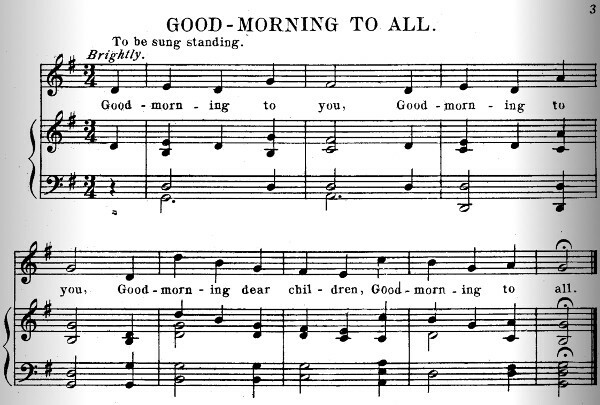Some things have been a part of our lives for so long that we don't even know how they came about. One of them is the song “Happy Birthday to You”. Even as babies, we learned to sing it, or at least to clap our hands in time with it. Every year, most Brazilians sing Congratulations to You more times than the National anthem. This is also a tradition in other parts of the world, who sing the square in several languages.
But how did Congratulations to You come about? How did he get to Brazil? why do we sing this song all over birthday? To answer these questions, let us go back more than a hundred years in time, more precisely to 1875.
Origin of Congratulations to You
It all started with the sisters Mildred Jane Hill and Patty Smith Hill, who were born in the city of Louisville, in the state of Kentucky, eastern United States. From a young age, her parents taught her the value of education and music. Mildred (1859-1916), the oldest, was a composer and music teacher. Patty (1868-1946) was a nurse and teacher at the main kindergarten in Louisville and one of the leading authorities on early childhood education in the region.
In the late 19th and early 20th centuries, educators began to use songs in teaching children. It was then that sisters Mildred and Patty had the idea of joining their skills to create children's songs using their own melodies or songs from the time. One of the songs created was Good Morning to All, which, in Portuguese, means Good Morning to All. Patty sang the song when the kids entered school in the morning. This song had the same melody as what years later would become Happy Birthday.
The song Good Morning to All it was successful in schools in Louisville and nearby towns, prompting the sisters to register it in 1893. In 1896, the song Good Morning to All was published by Clayton F. Summy Co, in the collection Song Stories for the Kindergarten (something like Songs with Stories for Kindergarten).

Page with Good Morning To All in the collection Song Stories for the Kindergarten
However, at the beginning of the 20th century, the melody appeared in other books, which replaced the passage “Good Morning to All” with “Happy Birthday to You”. At that time, birthday parties with children became popular in the United States, which motivated some composers to create songs to wish congratulations.
Copyright
In 1924, Robert H. Coleman she published a songbook that contained Happy Birthday to You, but without crediting the song to the Hill sisters. Shortly thereafter, the music was already appearing in movies, musicals from Broadway and sung telegrams.
The song became the most popular in the United States and its authorship began to be discussed. Some people deemed Happy Birthday to You to be in the public domain, but in 1933 Mildred and Patty's younger sister Jessica Hill filed a copyright lawsuit. She managed to prove the song's connection to Good Morning to All and shared the rights with the publisher who first published the song.
Until 2015, the English version of the song was making $2 million a year in royalties, which were split between the Hill Foundation and the Warner/Cappell Music label. As Mildred and Patty were unmarried and unborn, their closest relatives created a charitable foundation to collect money from the royalties. Clayton F. Summy Co. was bought back in the 30s and sold other times until it belonged to Warner/Cappell Music.
In February 2016, the courts in the United States decided that the song is in the public domain and, also, ordered Warner/Chappell to return $14 million to the people and companies that acquired the license.
You royalties they were paid every time the song was used for profit, such as on CDs and DVDs, concerts, advertising events, and radio and TV shows. Singing Happy Birthday to You at birthday parties did not charge royalties. If the judge's decision is overturned, the song will be in the public domain from 2030 onwards.
Brazil
The Brazilian version of Happy Birthday to You is authored by Bertha Celeste Homem de Mello (1902-1999), of Pindamonhangaba, Sao Paulo. In 1942, the Tupi radio she promoted a contest to choose the Brazilian version of the song, and Dona Bertha was the winner. She loved listening to the radio and participated in many contests promoted by broadcasters at the time – she even won a few.
Bertha de Mello's original version is:
"Happy Birthday to You
In this especial date
a lot of happiness
Many years of life"
Dona Bertha, as she was called, until the last years of her life, it irritated her when someone sang a part of her version wrong. The correct one is “Happy Birthday to you”, and not “for you”, and “very happy”, in the singular.
The court decision in the US does not affect the collection of royalties in Brazil. Currently, the royalties of the Brazilian version of Happy Birthday to You are divided as follows: 41.67% for the Hill Foundation; 41.67% for Warner Chappel; and 16.6% for the Bertha de Mello family. O Central Collection and Distribution Office (Ecad) is responsible for collecting and distributing the royalties, but monitoring is difficult and restricted to radio and TV. The song tops the Ecad fundraising ranking, but the amount is not revealed.
by Adriano Lesme
Brazil School Team
Source: Brazil School - https://brasilescola.uol.com.br/curiosidades/historia-parabens.htm
